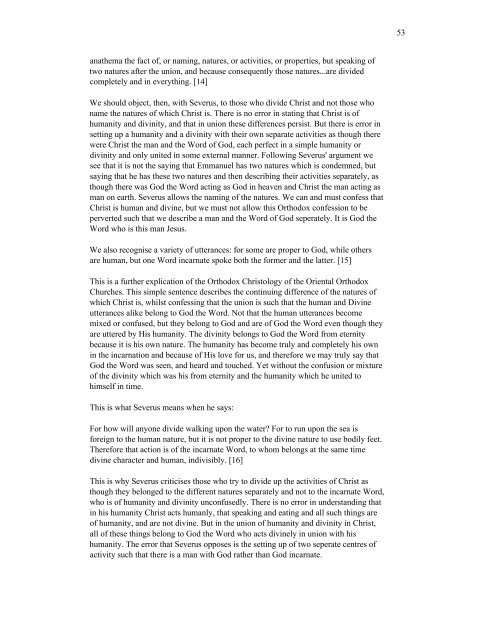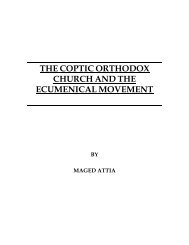Coptic interpretations of the Fourth Ecumenical Council - Saint Mina ...
Coptic interpretations of the Fourth Ecumenical Council - Saint Mina ...
Coptic interpretations of the Fourth Ecumenical Council - Saint Mina ...
Create successful ePaper yourself
Turn your PDF publications into a flip-book with our unique Google optimized e-Paper software.
ana<strong>the</strong>ma <strong>the</strong> fact <strong>of</strong>, or naming, natures, or activities, or properties, but speaking <strong>of</strong><br />
two natures after <strong>the</strong> union, and because consequently those natures...are divided<br />
completely and in everything. [14]<br />
We should object, <strong>the</strong>n, with Severus, to those who divide Christ and not those who<br />
name <strong>the</strong> natures <strong>of</strong> which Christ is. There is no error in stating that Christ is <strong>of</strong><br />
humanity and divinity, and that in union <strong>the</strong>se differences persist. But <strong>the</strong>re is error in<br />
setting up a humanity and a divinity with <strong>the</strong>ir own separate activities as though <strong>the</strong>re<br />
were Christ <strong>the</strong> man and <strong>the</strong> Word <strong>of</strong> God, each perfect in a simple humanity or<br />
divinity and only united in some external manner. Following Severus' argument we<br />
see that it is not <strong>the</strong> saying that Emmanuel has two natures which is condemned, but<br />
saying that he has <strong>the</strong>se two natures and <strong>the</strong>n describing <strong>the</strong>ir activities separately, as<br />
though <strong>the</strong>re was God <strong>the</strong> Word acting as God in heaven and Christ <strong>the</strong> man acting as<br />
man on earth. Severus allows <strong>the</strong> naming <strong>of</strong> <strong>the</strong> natures. We can and must confess that<br />
Christ is human and divine, but we must not allow this Orthodox confession to be<br />
perverted such that we describe a man and <strong>the</strong> Word <strong>of</strong> God seperately. It is God <strong>the</strong><br />
Word who is this man Jesus.<br />
We also recognise a variety <strong>of</strong> utterances: for some are proper to God, while o<strong>the</strong>rs<br />
are human, but one Word incarnate spoke both <strong>the</strong> former and <strong>the</strong> latter. [15]<br />
This is a fur<strong>the</strong>r explication <strong>of</strong> <strong>the</strong> Orthodox Christology <strong>of</strong> <strong>the</strong> Oriental Orthodox<br />
Churches. This simple sentence describes <strong>the</strong> continuing difference <strong>of</strong> <strong>the</strong> natures <strong>of</strong><br />
which Christ is, whilst confessing that <strong>the</strong> union is such that <strong>the</strong> human and Divine<br />
utterances alike belong to God <strong>the</strong> Word. Not that <strong>the</strong> human utterances become<br />
mixed or confused, but <strong>the</strong>y belong to God and are <strong>of</strong> God <strong>the</strong> Word even though <strong>the</strong>y<br />
are uttered by His humanity. The divinity belongs to God <strong>the</strong> Word from eternity<br />
because it is his own nature. The humanity has become truly and completely his own<br />
in <strong>the</strong> incarnation and because <strong>of</strong> His love for us, and <strong>the</strong>refore we may truly say that<br />
God <strong>the</strong> Word was seen, and heard and touched. Yet without <strong>the</strong> confusion or mixture<br />
<strong>of</strong> <strong>the</strong> divinity which was his from eternity and <strong>the</strong> humanity which he united to<br />
himself in time.<br />
This is what Severus means when he says:<br />
For how will anyone divide walking upon <strong>the</strong> water? For to run upon <strong>the</strong> sea is<br />
foreign to <strong>the</strong> human nature, but it is not proper to <strong>the</strong> divine nature to use bodily feet.<br />
Therefore that action is <strong>of</strong> <strong>the</strong> incarnate Word, to whom belongs at <strong>the</strong> same time<br />
divine character and human, indivisibly. [16]<br />
This is why Severus criticises those who try to divide up <strong>the</strong> activities <strong>of</strong> Christ as<br />
though <strong>the</strong>y belonged to <strong>the</strong> different natures separately and not to <strong>the</strong> incarnate Word,<br />
who is <strong>of</strong> humanity and divinity unconfusedly. There is no error in understanding that<br />
in his humanity Christ acts humanly, that speaking and eating and all such things are<br />
<strong>of</strong> humanity, and are not divine. But in <strong>the</strong> union <strong>of</strong> humanity and divinity in Christ,<br />
all <strong>of</strong> <strong>the</strong>se things belong to God <strong>the</strong> Word who acts divinely in union with his<br />
humanity. The error that Severus opposes is <strong>the</strong> setting up <strong>of</strong> two seperate centres <strong>of</strong><br />
activity such that <strong>the</strong>re is a man with God ra<strong>the</strong>r than God incarnate.<br />
53








